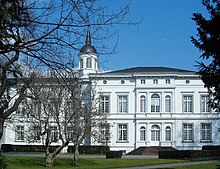4th G7 summit: Difference between revisions
→External links: + G8 summits navbox |
Lucy-marie (talk | contribs) |
||
| Line 21: | Line 21: | ||
*{{flagicon|United Kingdom}} '''[[United Kingdom]]''' - [[Prime Minister of the United Kingdom|Prime Minister]] [[James Callaghan]].<ref name="j-mofa1"/> |
*{{flagicon|United Kingdom}} '''[[United Kingdom]]''' - [[Prime Minister of the United Kingdom|Prime Minister]] [[James Callaghan]].<ref name="j-mofa1"/> |
||
*{{flagicon|USA}} '''[[United States]]''' - [[President of the United States|President]] [[Jimmy Carter]].<ref name="j-mofa1"/> |
*{{flagicon|USA}} '''[[United States]]''' - [[President of the United States|President]] [[Jimmy Carter]].<ref name="j-mofa1"/> |
||
+ |
|||
*{{flagicon|European Union}} '''[[European Commission]]''' - [[President of the European Commission|President]] [[Roy Jenkins]].<ref name="j-mofa1"/> |
|||
==Issues== |
==Issues== |
||
Revision as of 21:33, 10 April 2009
| 4th G7 summit | |
|---|---|
 Schaumburg Palace in Bonn | |
| Host country | Germany |
| Dates | July 16-17 |
The 4th G7 Summit was held at Bonn, Germany between July 16 and 17th, 1978. The venue for the summit meeting was at the former official residence of the Chancellor of the Federal Republic of Germany in Bonn, the Palais Schaumburg.[1]
The Group of Seven (G7) was an unofficial forum which brought together the heads of the richest industrialized countries: France, Germany, Italy, Japan, the United Kingdom, the United States, Canada (since 1976)[2] and the President of the European Commission (starting officially in 1981).[3] The summits were not meant to be linked formally with wider international institutions; and in fact, a mild rebellion against the stiff formality of other international meetings was a part of the genesis of cooperation between France's President Giscard d'Estaing and Germany's Chancellor Helmut Schmidt as they conceived the first Group of Six (G6) summit in 1975.[4]
Leaders at the Summit

 Canada - Prime Minister Pierre Elliot Trudeau.[1]
Canada - Prime Minister Pierre Elliot Trudeau.[1] France - President Valéry Giscard d'Estaing.[1]
France - President Valéry Giscard d'Estaing.[1] West Germany - Chancellor Helmut Schmidt.[1]
West Germany - Chancellor Helmut Schmidt.[1] Italy - Prime Minister Giulio Andreotti.[1]
Italy - Prime Minister Giulio Andreotti.[1] Japan - Prime Minister Takeo Fukuda
Japan - Prime Minister Takeo Fukuda United Kingdom - Prime Minister James Callaghan.[1]
United Kingdom - Prime Minister James Callaghan.[1] United States - President Jimmy Carter.[1]
United States - President Jimmy Carter.[1]
Issues
The summit was intended as a venue for resolving differences among its members. As a practical matter, the summit was also conceived as an opportunity for its members to give each other mutual encouragement in the face of difficult economic decisions.[4]
See also
Notes
- ^ a b c d e f g Japan, Ministry of Foreign Affairs (MOFA): Summit Meetings in the Past.
- ^ Saunders, Doug. "Weight of the world too heavy for G8 shoulders," Globe and Mail (Toronto). July 5, 2008 -- n.b., the G7 becomes the Group of Eight (G7) with the inclusion of Russia starting in 1997.
- ^ Reuters: "Factbox: The Group of Eight: what is it?", July 3, 2008.
- ^ a b Reinalda, Bob and Bertjan Verbeek. (1998). Autonomous Policy Making by International Organizations, p. 205.
References
- Bayne, Nicholas and Robert D. Putnam. (2000). Hanging in There: The G7 and G8 Summit in Maturity and Renewal. Aldershot, Hampshire, England: Ashgate Publishing. 10-ISBN 0-754-61185-X; 13-ISBN 978-0-754-61185-1; OCLC 43186692
- Reinalda, Bob and Bertjan Verbeek. (1998). Autonomous Policy Making by International Organizations. London: Routledge. 10-ISBN 0-415-16486-9; 13-ISBN 978-0-415-16486-3
External links
- No official website is created for any G7 summit prior to 1995 -- see the 21st G7 summit.
- University of Toronto: G8 Research Group, G8 Information Centre
